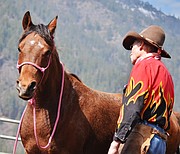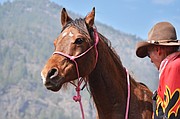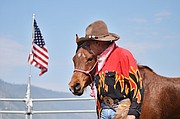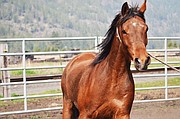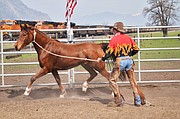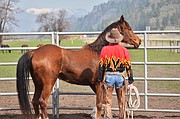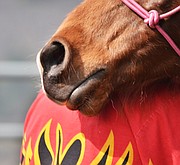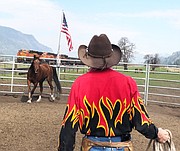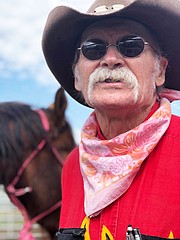Cowboy Johnny
Johnny Thompson of Paradise is keeping the that old western cowboy lifestyle alive in the Northwest with his old school approach to breaking in and re-training horses.
‘Cowboy Johnny’ as he is affectionately known by many locals, has been there and done that when it comes to cowboyin’ across the old west.
He has a unique set up at his small parcel of land that has a round pen for working and training horses that come to him.
The pen is set along side the rail road tracks in Paradise, right between the mountains and under the American flag.
“It’s a perfect spot to set up, I have everything I need to connect with these horses. They get use to loud noises, they are close enough to the trains to understand they won’t hurt them, and the traffic going by on the other side helps them get use to that aspect as well,” he explained.
Cowboy Johnny was working with a young Arabian in his round pen when the Valley Press stopped by and he explained that this horse had some troubles to which he was attempting to settle.
His owners had reached out to him as they had heard about Thompson through word of mouth within the horse community.
Though they loved their horse, he had some problems including barn sourness, and lack of respect that proved to be a worrisome trait.
They reached out to the local cowboy to see if he could help their horse and them better get along.
Thompson said that the little bay was a bit of a challenge, but he was ready for him.
He went onto explain that a lot of the times, there are the basics that get missed or rushed through; horses who have been rushed through tend to accumulate ‘issues’ down the track.
“He has had some problems in the past, that I know we can fix. I just move at his pace, he will tell me when he understands and when we can move to the next level,” Thompson said.
As he walked into the round pen, chaps, hat and a halter in hand; the little bay wasn’t ready to start the days work. Thompson took his time to and started to get that bay working off his body language.
“If you can control their feet, you can begin to attempt to get a hold of their mind and pay attention to you,” he said.
So as he worked the horse in a circle, the little bay took off scooting around with his feet moving too quickly at times resulting in a little trip here and there.
Thompson took his time and allowed the horse to wear himself out, as he said there was no use trying to start something because he simply wasn’t interested in anything Thompson was doing.
After around 20 minutes, the bay horse settled down and you could see his head lowering and his muscles relaxing; Thompson then put a halter on and the ground work was about to begin.
“Even though he has been broken in, we need to make sure he has a good foundation on him. That’s where the ground work comes in,” said Thompson.
While he began to work with the horse a train started to pass through, as the horn let out an all mighty echo in the valley, the bay quickly forgot about Thompson and was sure he had to get away.
Thompson held steady with his cool cowboy demeanor and began talking to the gelding trying to reassure him that it was nothing to worry about.
Once they came back together they again resumed their work and before long that little horse had partnered up with Thompson and the atmosphere changed.
“It’s on their time, you can’t rush horses, it all goes back to what they do naturally, in the wild,” said Thompson.
In years passed the local cowboy told of a story back in his cowboy days of how he was able to partner up with a lead mare from a herd of wild mustangs.
A moment he said he would never forget for as long as he lived.
A story that is best told from the horses mouth so to speak. However, he said it took a few days and a lot of patience. Not knowing at the time that he had a spectator witness to it all, Thompson explained that though it wasn’t practical in the sense of modern day cowboyin’; there was more in the experience that he learned from that mustang then he could ever re-pay her for.
“They’re a magical creature, they can teach you so much. There are a lot of young cowboys and trainers out there that have forgotten that. That’s why I bring it all back to the horse and work with him not against him,” said Thompson.
Before long, towards the end of the days’ session in the round pen, Thompson had taken off the halter and began dancing with the Arabian. No music, just two beings, immersed in each other and playing, shutting out the world around them.
Something truly out of a Hollywood movie, the change in the in demeanor from when they started an hour prior, to ending on a positive note, Thompson proved that he is part of a dying breed of old school horsemanship that lies right in the heart of Sanders County.














